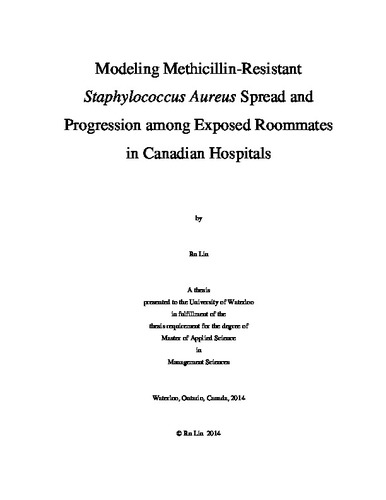UWSpace will be migrating to a new version of its software from July 29th to August 1st. UWSpace will be offline for all UW community members during this time.
Modeling Methicillin-Resistant Staphylococcus Aureus Spread and Progression among Exposed Roommates in Canadian Hospitals
| dc.contributor.author | Lin, Ru | |
| dc.date.accessioned | 2014-09-19 13:56:01 (GMT) | |
| dc.date.available | 2014-09-19 13:56:01 (GMT) | |
| dc.date.issued | 2014-09-19 | |
| dc.date.submitted | 2014-09-17 | |
| dc.identifier.uri | http://hdl.handle.net/10012/8819 | |
| dc.description.abstract | The control of Methicillin-resistant Staphylococcus aureus (MRSA) has been a controversial issue worldwide. In Canada, the incidence of MRSA among admitted patients has been increased steadily from 0.44 cases per 1,000 patient admissions in 1995 to 9.5 per 1,000 patient admissions in 2009. Screening and isolating exposed roommates of an MRSA carrier is recommended by Provincial Infectious Diseases Advisory Committee; however, the optimal screening strategy including the sampling time and the screening method still remains uncertain. This uncertainty makes it difficult to determine cost-effective isolation duration for the roommates and may result in increased cost, prolonged isolation time, and lowered quality of life for the isolated patients. In order to balance between the potential harms and benefits of reducing the isolation duration, a simulation approach has been established to model MRSA spread and progression among the exposed roommates by using data from the literature and Canadian hospitals. After the unknown parameters have been estimated from the model calibration, the calibrated model is transformed in comparing the following main policies: Policy 1) 7-day isolation and administering culture tests at day 0 and day 6, which is the existing policy in Grand River Hospital and St Mary’s General Hospital; Policy 2) 3-day isolation and administrating a culture test at day 0 and a PCR test at day 3, which is the proposed policy to be tested by simulation. Our numerical results show that under the baseline assumptions Policy 2 provides significantly shorter isolation time, dramatically lower total cost, and slightly less colonized and missed cases than those from Policy 1. In addition, extensive sensitivity analyses are conducted which illustrate that this conclusion is valid unless the transmission probability during isolation is extremely low. Furthermore, additional analysis is conducted to measure the robustness of our results to the violation of some of the disease progression assumptions. | en |
| dc.language.iso | en | en |
| dc.publisher | University of Waterloo | en |
| dc.subject | Operations Research | en |
| dc.title | Modeling Methicillin-Resistant Staphylococcus Aureus Spread and Progression among Exposed Roommates in Canadian Hospitals | en |
| dc.type | Master Thesis | en |
| dc.pending | false | |
| dc.subject.program | Management Sciences | en |
| uws-etd.degree.department | Management Sciences | en |
| uws-etd.degree | Master of Applied Science | en |
| uws.typeOfResource | Text | en |
| uws.peerReviewStatus | Unreviewed | en |
| uws.scholarLevel | Graduate | en |

